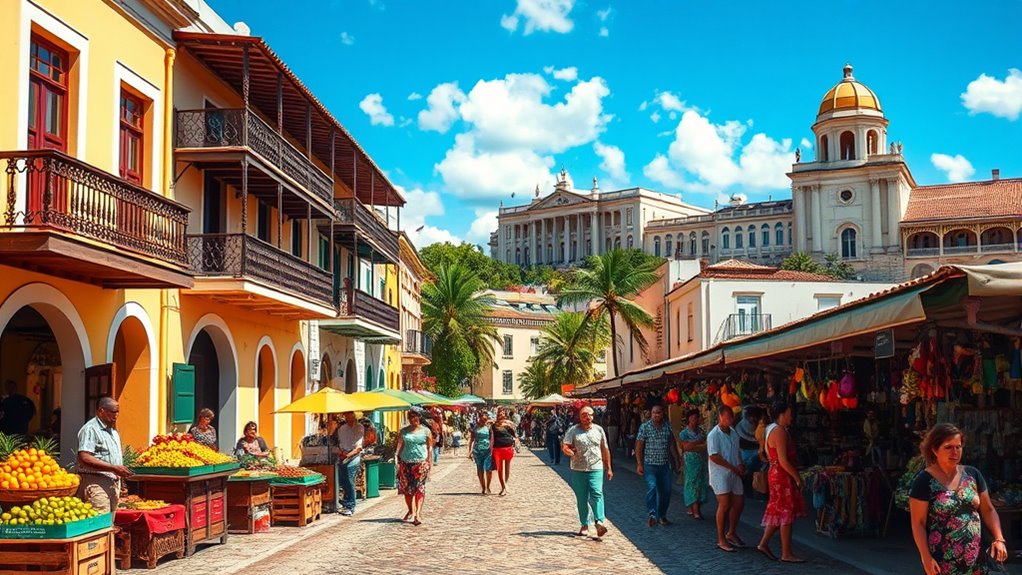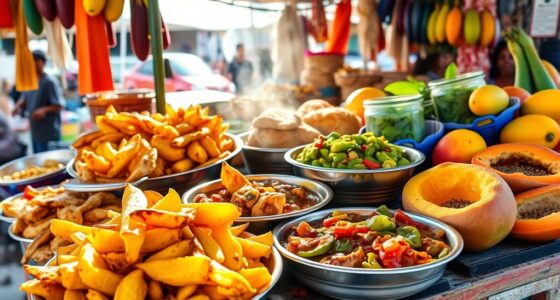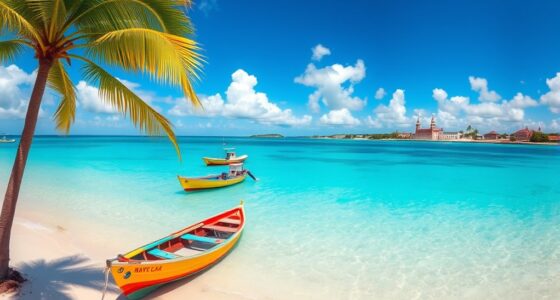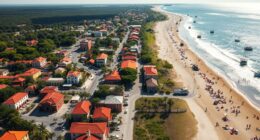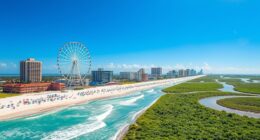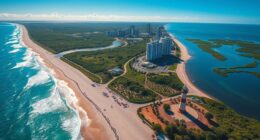Barbados’s history begins with Portuguese explorers and shifts to British control in 1625, shaping its plantation economy and vibrant culture. You’ll see influences from African, British, and Caribbean traditions in its music, festivals, and food. The nation’s journey from slavery to independence in 1966, and recently becoming a republic, highlights its resilience. If you explore further, you’ll uncover more about how Barbados’s rich past continues to influence its modern identity and global role.
Key Takeaways
- Barbados’s history includes Portuguese and British colonization, with a plantation economy rooted in sugar cane and African cultural influences.
- The society was historically divided by race and class, with slavery abolished in 1834, shaping ongoing social and racial dynamics.
- Barbados gained independence in 1966, became a republic in 2021, and developed a vibrant political culture with democratic elections.
- Cultural traditions like festivals, music, dance, and food such as flying fish and cou-cou reflect African, British, and local heritage.
- The island actively participates in regional and global climate initiatives, integrating environmental resilience into its cultural and national identity.
Early Exploration and Colonial Beginnings
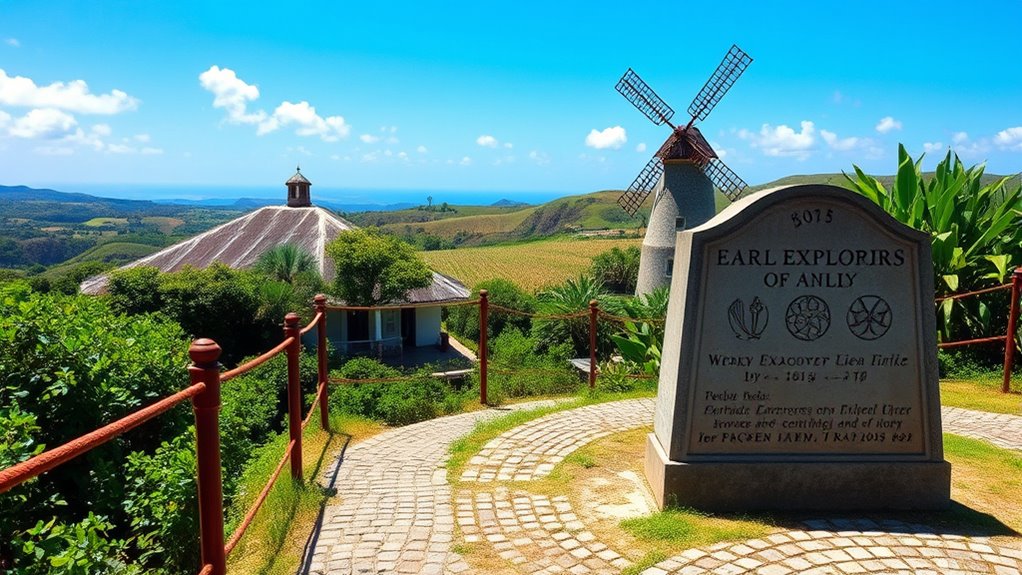
Although Barbados was briefly claimed by the Portuguese between 1532 and 1620, it was in 1625 that the island officially came under English control. Once under British rule, you’d find the island quickly transforming from a sparsely populated land to a thriving colony. Early settlers began cultivating tobacco and other crops, but the real shift happened in the 1640s with the introduction of sugar cane. Large plantations replaced small farms, consolidating land and labor under wealthy planters. The population grew rapidly, with a significant increase in enslaved Africans brought to work on the sugar plantations. This marked the beginning of Barbados’ plantation economy, shaping social structures and laying the foundation for its colonial society. The legacy of this plantation economy continues to influence the island’s cultural and social landscape today.
The Era of Slavery and Its Legacy
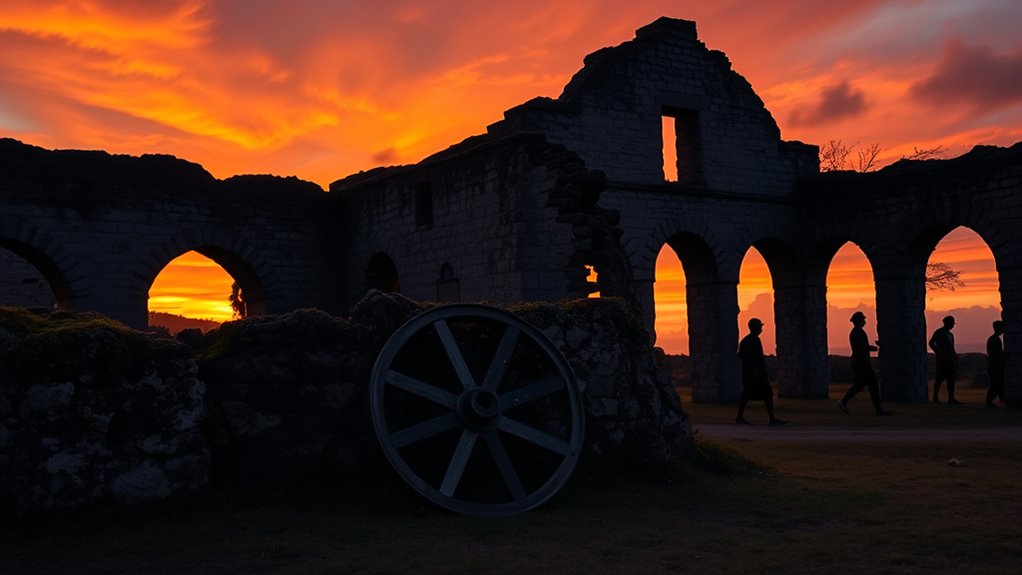
The shift from early plantation agriculture to a society deeply rooted in slave labor transformed Barbados’ social and economic landscape. You see, enslaved Africans became the backbone of the sugar industry, working under brutal conditions to sustain the island’s wealth. Society was sharply divided: free Europeans, indentured servants, and enslaved Africans, with race defining your status. Even after slavery was abolished in 1834, its effects persisted—racial inequalities, limited opportunities for former slaves, and a legacy of social stratification. Education and some economic mobility opened doors for a few, but many descendants of enslaved people continued to face systemic barriers. The scars of slavery shaped Barbados’s identity, influencing its social fabric, cultural expressions, and ongoing struggles for equality. Additionally, the racial hierarchy established during this period continued to influence societal attitudes and policies long after emancipation.
Path to Independence and Political Evolution
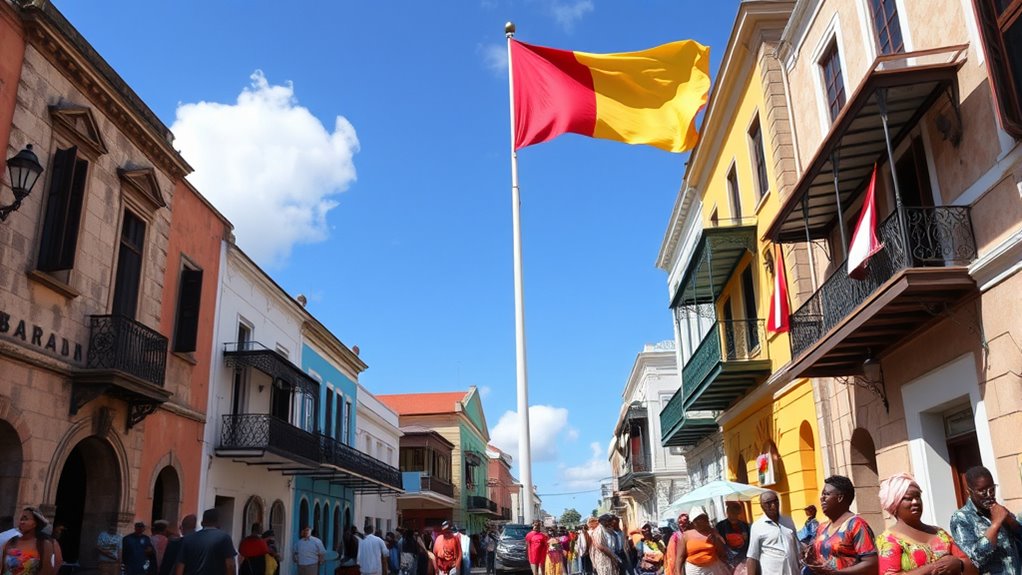
Barbados’s journey toward independence was shaped by a long history of political development rooted in its colonial past. You see, the island’s early governance began with a House of Assembly established in 1639, giving locals a voice within the British system. Over time, political organizations like the Barbados Labour Party (BLP) emerged, advocating for reforms and self-rule. By the 1960s, demands for full independence intensified, culminating in Barbados gaining independence from Britain on November 30, 1966. Errol Barrow became the first Prime Minister, guiding the nation’s *changeover*. Post-independence, Barbados retained constitutional ties to the British monarchy while establishing its own political identity. The nation’s political landscape evolved through democratic elections, with parties like the DLP and BLP alternating in power, shaping modern governance. Additionally, residency requirements for political candidates reflect the country’s commitment to democratic stability.
Cultural Roots and Societal Traditions
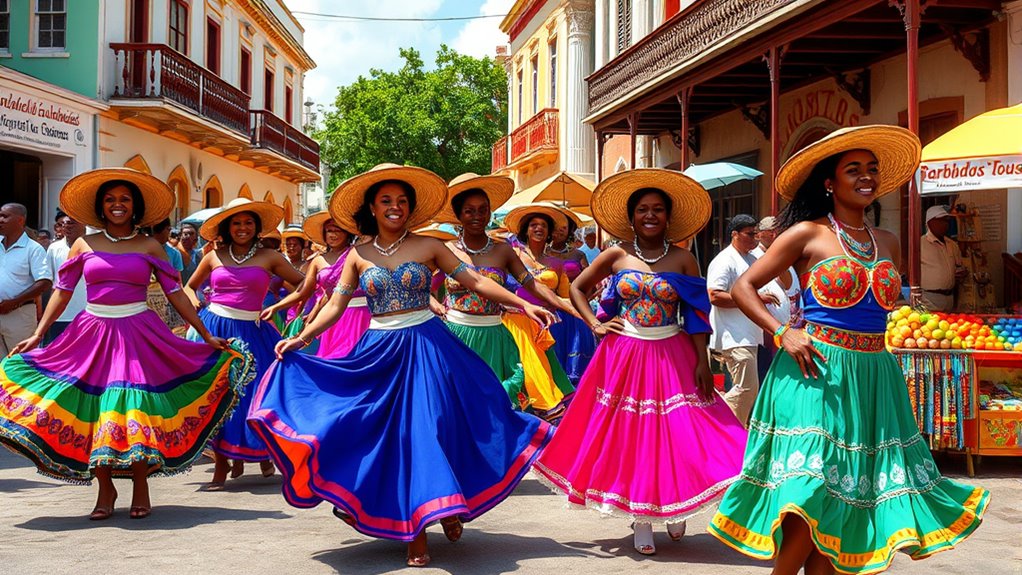
Have you ever wondered how Barbados’s vibrant culture reflects its rich history? You’ll see it in the lively festivals, music, and dance that blend African roots with British influences. The island’s Emancipation Day celebrations honor freedom and community, showcasing traditional songs, costumes, and storytelling. You’ll notice the significance of cricket, a sport introduced during colonial times, now a national passion symbolizing unity and pride. Language also reflects this mix, with Barbadian English infused with African and British phrases. Food traditions, like flying fish and cou-cou, highlight local ingredients and cultural history. These customs and celebrations reveal how Barbados preserves its identity through shared memories, resilience, and a deep respect for its ancestors’ contributions.
Transition to a Republic and Modern Political Changes

In recent years, Barbados has taken significant steps to redefine its sovereignty and deepen its national identity. On November 30, 2021, you witnessed the country shift from a constitutional monarchy to a republic, ending colonial ties with Queen Elizabeth II. Sandra Mason became the first president, symbolizing full independence. This move marked a historic shift, reaffirming Barbados’ autonomy. Since then, the government has focused on social reforms and regional leadership. You’ll see that the 2022 elections resulted in a landslide victory for the Barbados Labour Party under Mia Mottley, consolidating political stability. Key developments include:
- Establishment of a republic with a president as head of state
- Progressive legal reforms, such as decriminalizing gay sex
- Strengthening regional influence through Caribbean organizations
- Emphasis on climate action and global engagement
- Adoption of a reliable, safe backup power system to support critical infrastructure and ensure resilience during modern challenges
Cultural Icons and Contemporary Influence
Contemporary Barbados’s cultural influence extends far beyond its shores, largely thanks to global icons like singer Rihanna, who has become a symbol of Caribbean talent and resilience. Her music, fashion, and philanthropy inspire millions worldwide. Rihanna’s success highlights Barbados’s vibrant creative spirit and ability to produce influential figures. You feel pride seeing her represent your island on the global stage. Other icons, like cricket star Jason Holder and poet Kamau Brathwaite, continue to shape cultural identity. Their achievements evoke deep emotion and showcase Barbados’s diverse talent. Additionally, cultural heritage plays a vital role in shaping the island’s contemporary influence and national pride.
Barbados’ Role in Regional and Global Issues
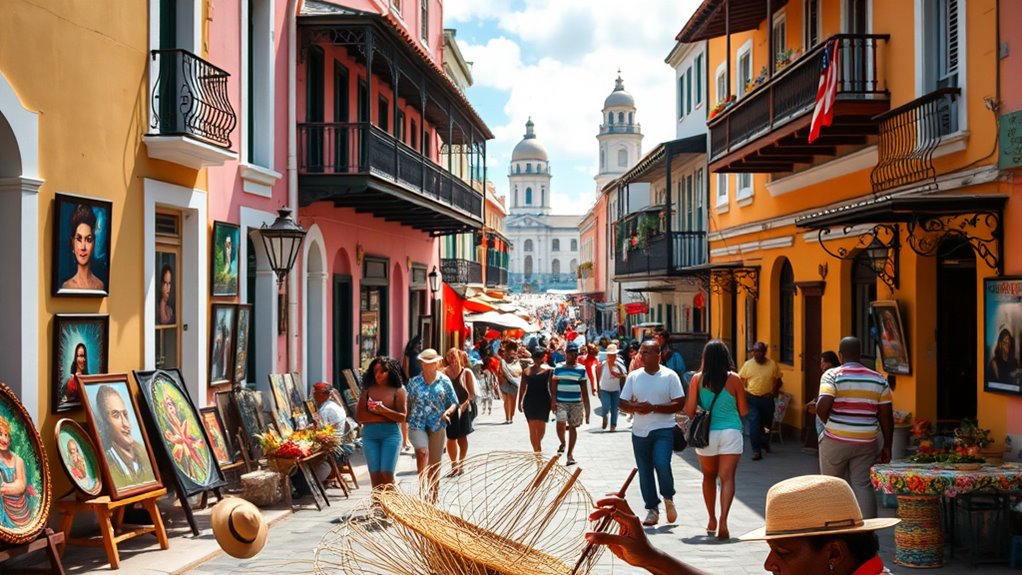
Barbados actively leads regional initiatives to promote Caribbean integration and economic cooperation. It also plays a significant role in global climate justice efforts, advocating for environmental sustainability and resilience. As a small nation, Barbados’s contributions highlight how regional collaboration and international advocacy can influence worldwide issues. Additionally, Barbados has been involved in promoting climate resilience and sustainable development practices to address the unique challenges faced by island nations.
Regional Leadership Initiatives
Have you ever considered how a small island nation can take on a leadership role in regional and global issues? Barbados actively contributes through regional initiatives that promote integration, sustainability, and social justice. You’ll find Barbados leading efforts in organizations like CARICOM and the Caribbean Development Bank, advocating for economic cooperation and disaster resilience. The country also pushes for climate justice, hosting conferences and supporting renewable energy projects. Barbados champions human rights, particularly decriminalizing gay sex and promoting gender equality. Additionally, the nation provides aid to neighboring countries facing crises, showcasing regional solidarity. Its leadership inspires smaller nations to voice their concerns and collaborate for shared progress. Barbados’ proactive stance underscores how a small island can shape regional policies and influence global conversations. practical guidance
Climate Justice Contributions
As a small island nation highly vulnerable to climate change, Barbados actively advocates for regional and global climate justice. You participate in international climate negotiations, pushing for fairer emissions reductions and financial support for vulnerable countries. Barbados champions renewable energy initiatives and promotes sustainable tourism to reduce carbon footprints. You have also led regional efforts through organizations like CARICOM, urging collective action on climate resilience. Barbados’s high-profile donations to environmental causes demonstrate its commitment to global climate justice. By sharing its experiences with rising sea levels and extreme weather, you help raise awareness and influence international policies. Your leadership emphasizes that climate change is a moral issue, demanding urgent action from the world community to protect vulnerable nations like Barbados. Additionally, fostering active dialogue with global stakeholders enhances understanding and accelerates the implementation of climate solutions.
Frequently Asked Questions
How Did Indigenous Peoples Influence Barbados’ Early History?
You might not find much direct evidence of indigenous peoples in Barbados’ early history, but their presence shaped the island’s initial landscape and environment. Indigenous peoples likely introduced farming techniques and cultivated local plants, influencing early settlement patterns. Their absence after European contact led to the island’s rapid colonization and development under European powers. While their direct impact diminished, their legacy subtly influenced Barbados’ natural environment and early interactions with explorers.
What Are Traditional Barbadian Festivals and Their Historical Significance?
Imagine a lively carnival where drums beat like the echoes of ancient African rituals—that’s a traditional Barbadian festival. Crop Over, for example, celebrates the end of the sugar cane harvest, blending African roots with British colonial influences. You’ll see vibrant costumes, dance, and music that honor enslaved ancestors’ resilience and culture. These festivals serve as powerful reminders of Barbados’ history, resilience, and the enduring spirit that unites its people today.
How Has Barbados’ Cultural Identity Evolved Post-Independence?
Post-independence, you see Barbados embracing its unique cultural identity by blending African roots with British colonial influences. You notice celebrations like emancipation festivals highlight freedom and community spirit. Education and arts flourish, with figures like Rihanna showcasing the island’s talent globally. Recent changes, like becoming a republic and progressive laws, reflect your nation’s ongoing journey toward sovereignty and social evolution, emphasizing pride, diversity, and resilience in shaping Barbados’ modern cultural landscape.
What Role Did Women Play in Barbados’ Political Development?
Women in Barbados have been the heartbeat of political change, breaking barriers like waves crashing on the shore. You see, trailblazers like Mia Mottley, the first female Prime Minister, have shattered glass ceilings, guiding the nation’s ship toward progress. Their resilience fuels social reforms, inspires future leaders, and shapes a more inclusive democracy. Women’s voices now echo loudly in Barbados’ political landscape, steering her toward a brighter, equitable horizon.
How Is Barbados Preserving Its Cultural Heritage Today?
You can see Barbados preserving its cultural heritage through vibrant festivals like Crop Over, which celebrate history and community. You’ll find traditional music, dance, and craft practices upheld in local events and museums. The island also promotes its history through education and tourism, highlighting its African and British roots. Additionally, Barbados honors its emancipation legacy annually, ensuring future generations stay connected to their cultural identity and history.
Conclusion
As you explore Barbados’ rich history, you see a tapestry woven with resilience and tradition. From colonial struggles to vibrant culture, this island’s story balances its painful past with its lively present. The legacy of slavery contrasts with its modern identity, just as its independence brings hope amid ongoing global challenges. In embracing both, Barbados stands as a demonstration of enduring strength and evolving grace, shaping a future rooted in a proud, complex heritage.

